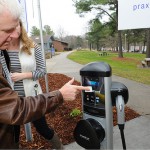Man arrested for charging his EV without permission for 20 minutes
In 2010, Georgia had one of the slowest growing economies in the United States, but this year it’s racing ahead with almost 3,000 electric vehicles. That figure makes it one of the fastest growing states for electric vehicle ownership — except the Peach State doesn’t have the infrastructure for those motorists.
Just ask Kaveh Kamooneh, who was arrested last month when he used a public power outlet in Chamblee, Georgia, to charge his electric vehicle (EV). The driver was using the outlet outside of the town’s local middle school, where his son was at tennis practice, when a police officer arrived. He had been called to the scene, the police report stated later, by someone complaining of Kamooneh’s illegal use of the outlet.

Image by the illustrious Richard Masoner
Unable to find the car’s owner, the officer opened its unlocked door and found a piece of mail with Kamooneh’s address on it. The driver had noticed someone in his vehicle at that point and, when he approached, was told by the officer that he would be arrested or charged with theft.
Kamooneh dismissed their exchange, but eleven days later two deputies showed up at his house and arrested him for theft of electrical power. The motorist admits that he did use the outlet for approximately twenty minutes and that he hadn’t sought formal permission from the school, which was closed at the time of the incident.
In his experience as an EV driver, however, Kamooneh says that gaining access to an outlet is often an informal exchange and that he had not had a problem in the past. He does not consider what he did as wrong. Not “every taking of something without permission is theft,” Kamooneh told the press later.
Clean Cities Atlanta, an electric vehicle advocacy group, estimates that the power Kamooneh accessed was worth about a nickel of electricity.
Chamblee Police Sergeant Ernesto Ford doesn’t care how much electricity was involved or how much it cost, though. Kamooneh “broke the law,” Ford said. “He stole something that wasn’t his.”
Yet according to a recent study, fewer than half of EV owners have an off-street parking spot where they can install charging stations, causing them to rely on scarce public stations. As if in recognition of that need, Georgia governor Nathan Deal and lieutenant governor Casey Cagle attended in October the dedication of two new EV charging stations at a state parking lot across from the Georgia Capitol.
“We really have made great strides focused on sustainability,” Cagle told the media at the time. Like Kamooneh, he owns a Nissan Leaf.
But the state’s political goals don’t appear in keeping with its regulatory or enforcement behavior in Kamooneh’s case, especially when his actions are compared to those of others who regularly use publicly available outlets at airports, cafes, or similar locations to charge a miscellany of devices. Or, in another comparison, to the actions of those who “borrow” Wi-Fi from their neighbors’ networks.
To be fair, a small number of arrests have been made for Wi-Fi theft, but until states can provide EV drivers with the kind of infrastructure support they offer motorists of gas-powered cars, it’s not clear that EV owners are committing crimes by accessing power at publicly accessible outlets.
Related Posts
Category: Parking Tech, Regulations




















